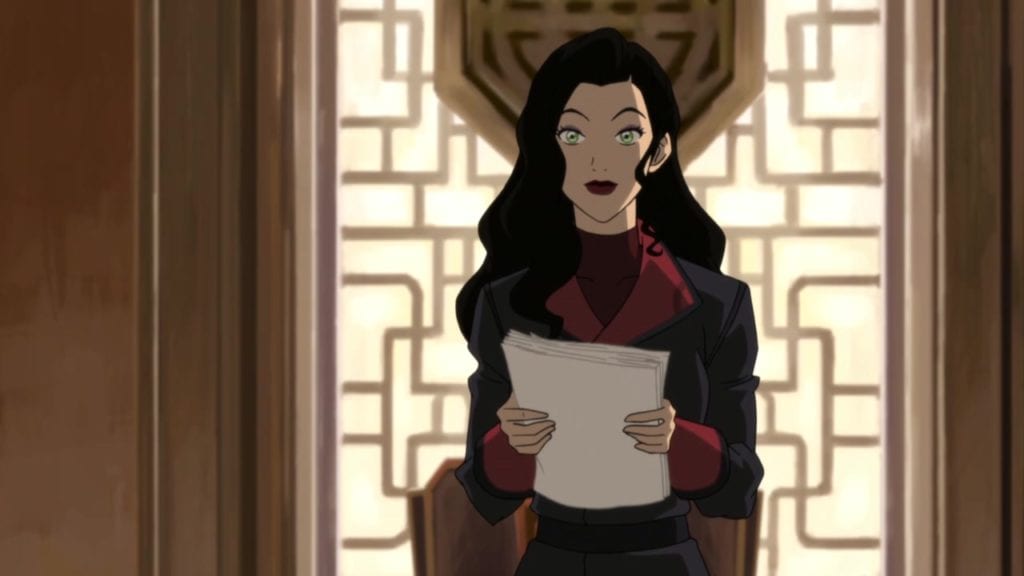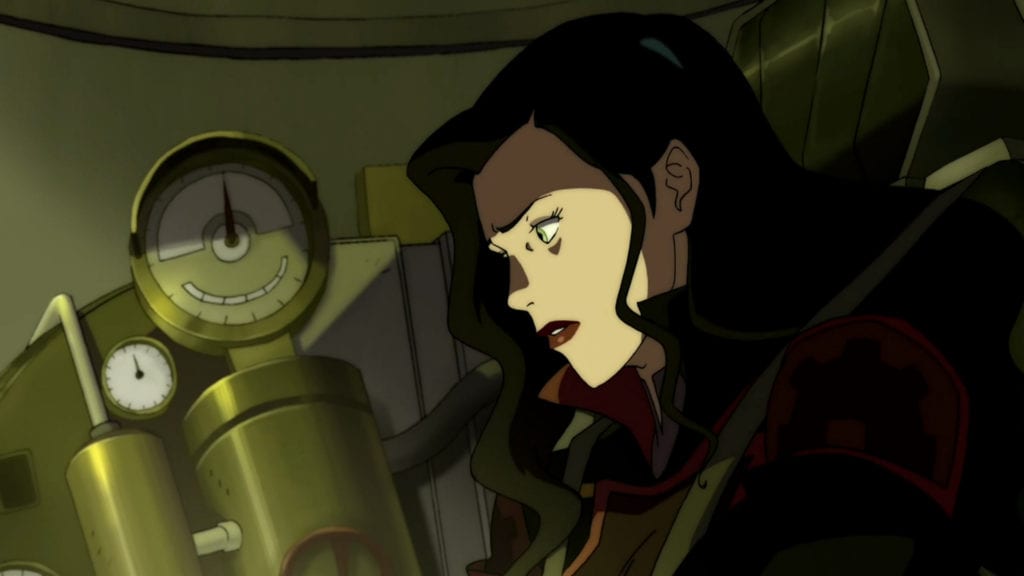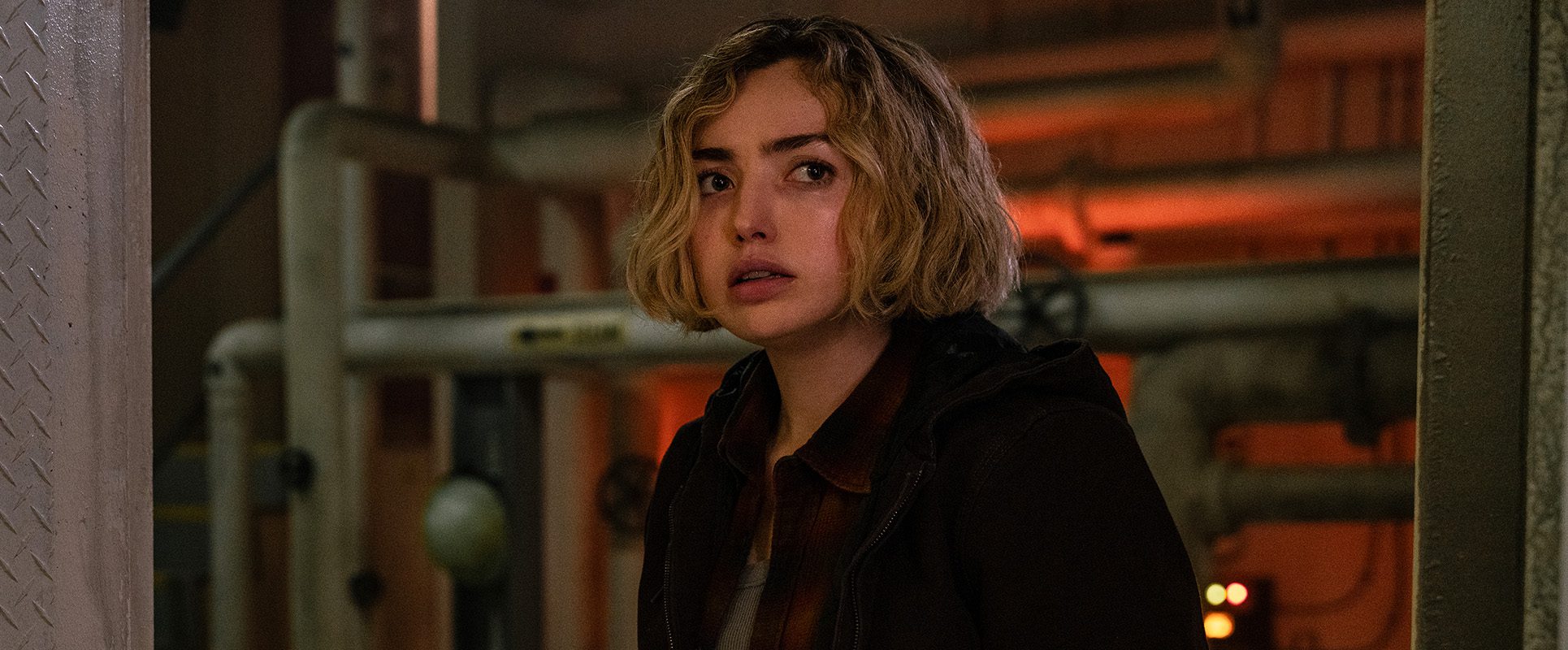If you spend some time looking through our categories and tags here, you’ll notice that there’s quite a few concepts and character archetypes we tend to bring up a lot, be it acedia, the dutiful princess trope (“Martells”), Watsonian versus Doylist lenses, and even the phrase “media is not created in a cultural vacuum.” Yet there’s one recurring reference ‘round here that we haven’t bothered to explain, and it comes in the form of a character from Avatar: the Legend of Korra by Michael Dante DiMartino and Bryan Konietzko: Asami Sato.
You may recognize the name from “Korrasami,” the show’s unexpected and ground-breaking end-game relationship between the protagonist Korra and her not-just-gal-pal. While there’s no reason to ever stop gushing about that, or the show in general, there’s a lot more to Asami, and she has features we seem to be finding highlighted in an increasing number of characters. Kate Kane’s run in the Detective Comics Rebirth featured her making strikingly similar decisions when confronted with a strikingly similar choice as Asami had in Korra’s first season, Sansa Stark in George R.R. Martin’s A Song of Ice and Fire exhibits nearly the same personality and constantly-whirring brain, and Supergirl’s Lena Luthor may as well be a copy-paste at this point.
Thanks to the rule of three, it means it’s time to officially take a closer look at who Asami is, so that we can keep our eyes peeled for more Satos (or just shake our heads when Lena inevitably repairs an airship while flirting with Kara).
Intuition and Empathy
Out of the gate, it’s important to note something: Asami is a secondary character on a Y7 show who actually had a surprisingly limited amount of screentime. Yet even though she turned into something of a Where’s Waldo game in the final season, her scripting was quite consistent and she was packed with a ton of agency, so she felt like a fully realized character just from the few moments where she got to wield it.
Asami is a nonbender within her universe—part of the disempowered majority who are inherently vulnerable to attacks from benders (especially when they form crime organizations), which is how her own mother died. She did take self-defense classes and is a capable enough fighter as a result, often donning an electrical shock glove, but to say that’s her primary weapon or even go-to strategy wouldn’t be accurate. In fact, when there’s no vehicles for her to build or pilot, she normally watches fights from the sidelines.
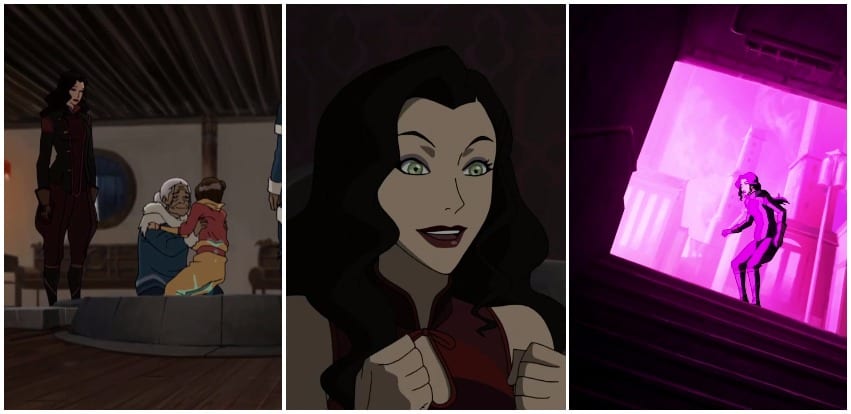
However, that bit about vehicles is rather important. You see, Asami is an engineer, though Omnidisciplinary Scientist is a far more accurate title. What she lacks in physical fighting prowess, she makes up for in innovation and technological contributions, or at the least is able to hop into a never-before-seen tank and have a chicken fight to the death because she once took a forklift for a spin. She tends to crash…all her vehicles, often for no discernible reason, but she’s also stupidly rich and takes over her universe’s equivalent of the Ford Motor Company in the 1920s by the second season, so we have to assume it’s fine.
This is important, of course, and Asami’s terrible piloting and constant supply of luxury technological goods do help to drive the plot. Heck, the third season is spent with Korra and Co. flying through the Earth Kingdom on what looks to be Pemberley with wings because Asami wanted them to go “in style.” But even this comes from a more fundamental aspect of Asami’s personality: her intuition. Throughout the show, she demonstrates an ability to read a situation or person, and then find a solution or tactic to reach a desired outcome. From turning one of Bumi’s outlandish stories about hog-monkeys into a battle strategy, to manipulating a guard into tying her up against a bar she later pries off the wall (damn shoddy Cabbage Corp. workmanship), to even dominating at pai sho games, Asami is able to use her brain as her “weapon.”
Though she also uses it for far nicer aims, such as completely redesigning her city’s infrastructure, reframing a problem as an asset and bringing Korra’s spiritual vision for the world into the material. Like one does.
There is one strong limit to her intuition, which is that we see Asami place her trust in two people she shouldn’t have: her father, Hiroshi, and Varrick, a shipping merchant/inventor-turned-competitor (it’s weird). In the case of Hiroshi Sato, it’s rather understandable why a daughter would probably need quite a bit of overwhelming evidence to realize that the guy who’s been raising her on his own for fourteen years was secretly a mustache twirling villain who helped fund a genocidal revolution that bombed the entire city. With Varrick, we’re shown that Asami’s company is about to go belly-up if she doesn’t at least try to make a partnership with him work. Given that she views Future Industries as “the only family [she] has left,” turning a blind-eye to some warning signs with Varrick more demonstrates just how much in crisis mode she is during this time. Though she kind of is in crisis mode for an astounding percentage of the show.
Either way, Asami adapts her approaches after her dealings with both of these men, and as a result shows extreme sensitivity towards lying and being abandoned. She also makes sure to protect herself from being blindsided again. Mostly through threats.
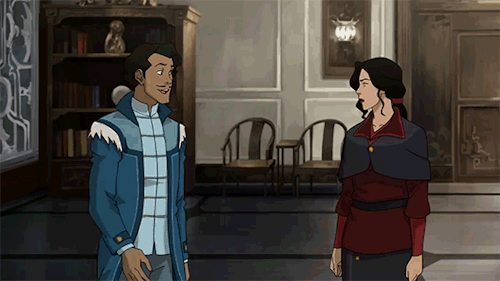
Though her intuitive understanding of situations and ability to break-down complex problems is one of the strongest aspects of her personality, her empathy is equally as important, if not more so. We are shown Asami caring about the well-being of just about everyone she comes across, not hesitating to comfort Korra, Mako, or Bolin in moments where they’re feeling stressed and confused. In fact, her entire first date with Mako seemed to be bonding over dead parents and getting him to open up about what was bothering him. Mako of all people. Trust me when I say that this is not a small feat.
We see this most explicitly when Asami serves as what appears to be Korra’s primary caretaker for a few weeks following an injury that left her in a wheelchair. Heck, she even offered to travel down the south pole with Korra when that’s what the Avatar decided she needed in order to heal, which is not something most CEOs and business owners are wont to do.
This isn’t to say Asami’s the babysitter of the group. Though she’s probably the most emotionally mature, at least before the final season, the dynamic is very much just that of four young adults hanging out together. Instead, she’s just kind of the friend who will actively try to pull out what’s bothering you and be there to talk things through, usually framing issues in the big picture, since she is always solutions-oriented. If you come across an Asami Sato in the wild, treat her nicely.
Truth, Justice, and the United Republican Way
This probably shouldn’t be a shock, but because since she is primarily concerned for the well-being of others, she’s a good person. I mean, a Good™ person. Her commitment to Korra’s cause is never in question, and she never once places herself in any sort of opposition to the Avatar’s decisions or aims, even when it comes at a major inconvenience, a great personal cost, or involves doing some…questionable things.
For instance, when new airbenders begin popping up thanks to Korra opening two spirit portals, Korra decides she wants to help rebuild the Air Nation, which is a worthy cause given that they were victims of genocide. However, to help her bring this about, Asami willingly goes along with a plan that involves acts of war against the Earth Kingdom—at least two or three times I might add. I’m sure Future Industries doesn’t need that market or anything.
Yet Asami’s most telling moment comes when it’s revealed that her father has secretly been working with (and funding) the revolutionary group trying to take all benders’ abilities from them, because benders killed her mom. Asami is not into the broad-brush blame game, and even though nonbenders do have legitimate cause for complaint with how their government is failing to protect them, she makes a decisive choice to attack her father and save her friends. And again, Hiroshi is the only family she’s had since her mom died when she was five, and she met Korra, Mako, and Bolin…maybe a few months before this?
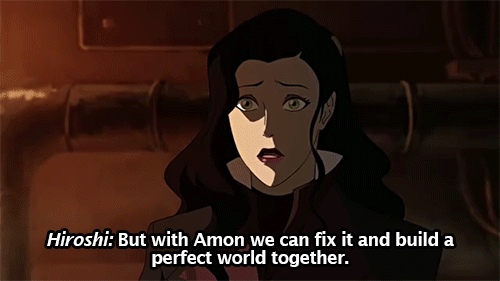
Plus, she not only makes this choice, but then becomes committed to stopping Hiroshi to the point where she says, with complete sincerity and intensity:
“It’s time to take down my father.”
They do.
The most important thing to understand is that like Asami’s ability to problem-solve, her commitment to justice is based on her bigger-picture ideology. Even though spirit vines overtake Republic City, rendering an entire area unlivable, damaging pipes everywhere, and blocking roadways, Asami never expresses any sort of frustration, actually going as far as to tell Korra that she can’t take the negative feedback for these very real problems “to heart.” She then goes on to devote herself to restructuring the city’s entire infrastructure for three years to accommodate the situation. When Republic City is threatened with the world’s allegory for a WMD, Asami gets to work on technology that can help in a battle, though refuses to use that same weapon in her designs, instead utilizing biomimicry to design flying mecha suits.
An interesting thing about Asami is that the second anyone challenges or seeks to stand in the way of her, well, pursuit of justice, she gets angry. She snaps at police officers and politicians when she thinks they’re profiling nonbenders, she snaps at detectives who don’t seem to be doing the best job at their investigation, any time Varrick appears again she snaps because he’s proven himself untrustworthy, and she even fights angrily. She’s actually the only person in the main group we see do this with any sort of consistency.
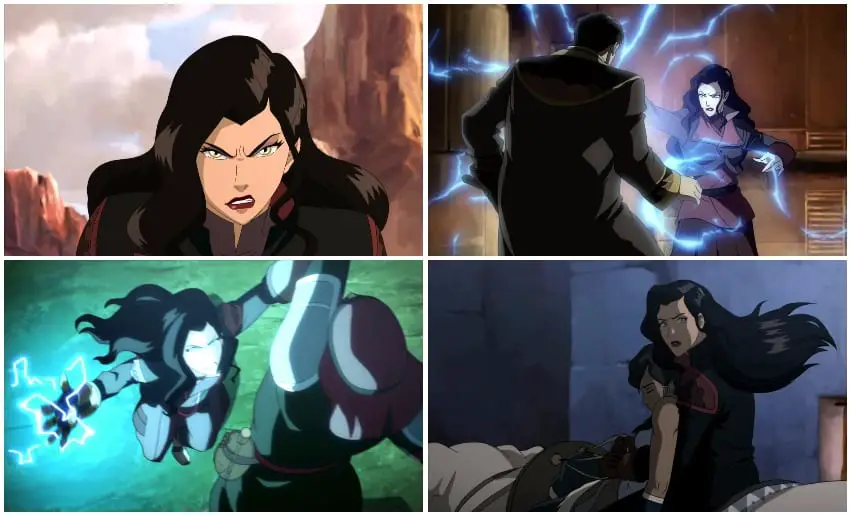
She’s no waifish idealist; Asami’s the person who willingly gives gang members some of her tech in exchange for their help. At the same time, she avoids that man-tear drinking femme fatale vibe she might have originally been designed for thanks to her guiding empathy and caretaker nature, while also neatly side-stepping “tsundere,” since we see her frustrations manifest, and they’re the result of her consistent aims and past hurts.
This is why Asami Sato doesn’t fill a trope—she’s a trope-setter, damnit.
My name is Asami Sato and my life is garbage
You know what else Asami isn’t? A Mary Sue. And yes, I’m aware that the term has been misused into oblivion and more or less gets applied to any woman exhibiting competency. But it does need to be said that in fandom dialogue, particularly as the show was finishing its run and immediately after, this was a common term attached to Asami. I must admit, every time I hear it, I can’t help but laugh, because I can’t think of anything more off the mark.
“The canon protagonists are all overwhelmed with admiration for her beauty, wit, courage and other virtues, and are quick to adopt her as one of their True Companions, even characters who are usually antisocial and untrusting; if any character doesn’t love her, that character gets an extremely unsympathetic portrayal… Other than that, the canon characters are quickly reduced to awestruck cheerleaders, watching from the sidelines as Mary Sue outstrips them in their areas of expertise and solves problems that have stymied them for the entire series.”
I’ve called Lin Beifong the “unsung hero” of Korra, though a lot of that had to do more with being passed up in fandom conversations. However, if there’s one person who in-canon is rarely thanked and often shit on, and who was even turned into a literal awestruck cheerleader despite having just found out she partnered with the guy who tried to kill the President and start a war, it’s Asami.
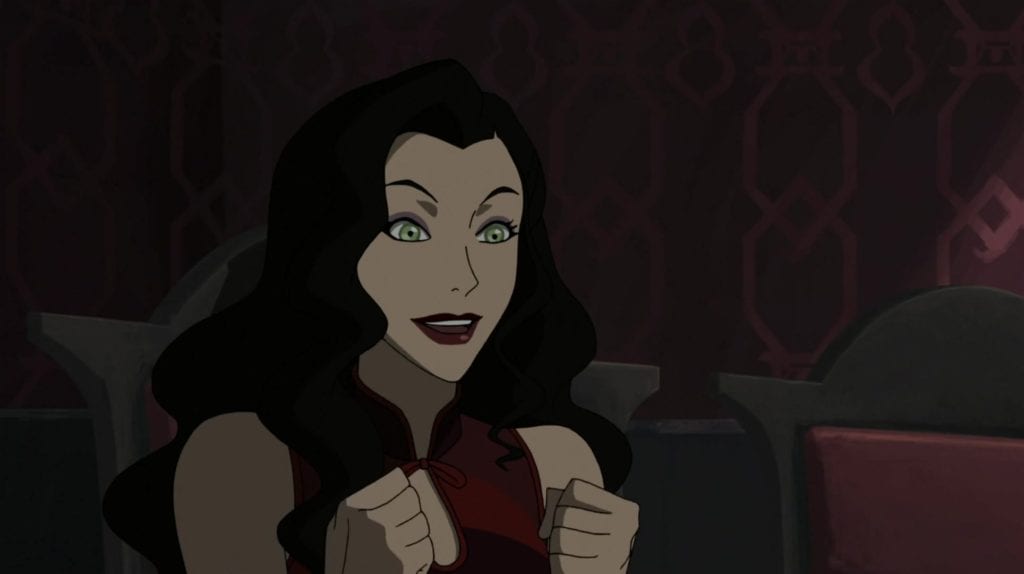
Heck, Mako more or less treats her like some gum stuck to his shoe for two seasons, and he gets anything but an unsympathetic portrayal! The only person who loved her from the start was Bolin, and he’s also the dude who needed to be threatened with a reeducation camp to realize that the dictator he was working for *might* not be the best person to measure that. Though, Korra did come around to her very quickly.
It’s actually remarkable to think about the amount of suffering Asami endured, and how much of it was in the background. Her own father tries to murder her, and though Bolin fortunately intervened and stopped Hiroshi from smushing her like a bug (yikes, poetic justice for Hiroshi in the end?), this is never mentioned afterwards. In fact, no character even asks her the bare minimum of “hey, how are you doing with that whole dad-betrayal situation?” They find out Hiroshi isn’t a good guy, immediately after Mako actively pursues a relationship with Korra while still dating Asami and making no effort to hide this, and she ends the season alone, being handed a company she’s got no clue how to run.
In the second season, Asami works overtime to keep Future Industries afloat because it’s more or less all she has, trusts in a business partner who tries to steal it out from her, gets quasi-back together with Mako only for him to publicly choose Korra over her because Korra has amnesia (it’s complicated), and runs her company so poorly that all her goods can fit in a single warehouse. In fact, within the span of about an hour, she finds out the truth about Varrick, gets dumped by Mako for a second time, and then is forced to go visit the jerk who tried to steal her company in jail, despite us learning that it’s an emotional toll for her to set foot near one given her father being behind bars. And no one says a thing.
Just that quintessential perfect character who steamrolls the narrative, right?
Somehow she pulls her company out of its hole and is able to travel with Korra, provoking the Earth Kingdom, reassembling the Air Nation, and quite obviously falling in love with the woman in the process. We see Asami taking care of Korra for a few weeks, urging her to go easy on herself, and assuring her that she’s there for her. Korra ends up leaving for what she says is going to be two more weeks so that she can heal, but it ends up being three years (her recovery arc is beautiful, by the way). From what we can tell, Asami writes her a letter just about every day, and gets a grand total of one back after two years. Yet this is enough for our engineer to be speaking about Korra in gushing tones in the final season’s opener.
Asami decides to try and repair her relationship with her dad by visiting him in prison, and when the city falls under attack, he ends up working with her on the flying mecha suits to save the day, only to sacrifice himself in a crucial moment to the cause. She and Korra do get together, so there’s one good thing that happens to her. But looking back over this description, it’s kind of the only one. Well, two: she runs a successful company and is stupidly rich.
It’s not just that Asami deals with a lot of awfulness; pretty much everyone else in the series does, and Korra especially gets put through the wringer (though at least in the last season, Konietzko and DiMartino gave her narrative space to explore her own trauma). However, with Asami, one notable thing she does is take herself out of the equation. She’s no Dutiful Princess who hides from her own feelings—rather, she understands and is in command of her feelings, but will swallow them and not assert herself if she thinks it will inconvenience others.
She sits quietly after almost being killed by her dad, because Korra lost her bending and it’s not the time. She somehow refrains from slapping Mako’s face off of his face following breakup #2, because there’s a task at hand and everyone needs to be focused on the cataclysmic event. She’s willing to back-burner her company for Team Avatar business time and time again. And most notably, she doesn’t think to assert anything she’s feeling, despite being canonically in love with Korra, when she’s taking care of her. It’s worth pointing out that this is a complete reversal of how Mako behaved in a similar situation.
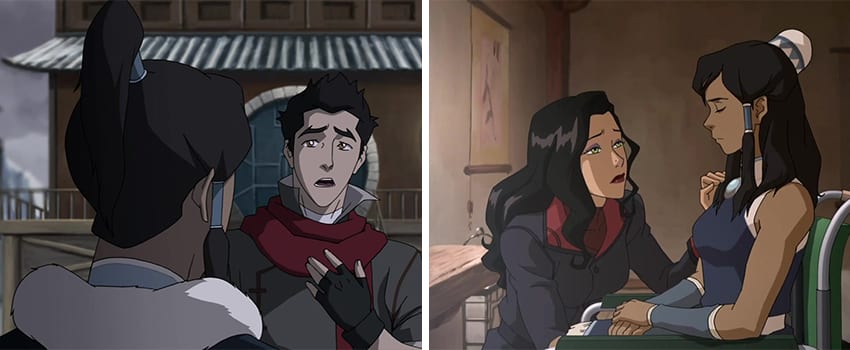
Since Asami’s always stuffing her feelings down, it’s not exactly a shock that her anger can flare up quickly. Perhaps the most telling moment is when she snaps at Korra shortly after they’re reunited in the final season. Asami clearly understands everything Korra’s gone through and is worried about what she heard in the letter, but we’re also seeing a person who has repressed feelings for three years and who was actively deceived by Korra (everyone else was too) for six months. It was just a moment of frustrations boiling over, but it perfectly encapsulates her character. Asami is more or less the on-screen embodiment of “still waters run deep.”
If you give a story a Sato
In many ways, that’s the reason Asami feels like such a fresh and ground-breaking character: we don’t see her on-screen a lot. In fact, her personality traits don’t make her very suited to it. There’s plenty of introverted characters, but Asami’s entire personality and mode of operation are based on very internal motivations and processing. You can tell that her mind is whirring away, though she doesn’t say a lot when she speaks. Instead, her words can feel carefully weighed:
“You tainted our past and destroyed our future together.”
“Meticulous” is not an uncommon adjective attached to her. Of course, when she’s needed in a split-second, her intuition is able to guide her:
Korra: Uhh, this evening? I’m not sure about leaving so soon…
Asami: [lying] Because our airship is having engine trouble. It’ll take me until tomorrow to finish the repairs.
Asami was utilized in interesting ways in many fights, and frankly her “self-defense” skills are ridiculously overpowered, even though she’s never the one to be going against elite benders. But in general, the *meat* of her character is…not very suited to the screen. She begs for the written medium, where what’s in her brain can be explored and even fully explicated, depending on style. It’s perhaps thanks to the prevalence of Korra fanfics that she does have a healthy number of fans.
But that doesn’t mean she’s a worthless on-screen character either—just one we don’t see a lot of. We’re so used to the externally-driven hero, and what we tend to celebrate is tied to action. Introverted women who are perceptive and empathetic can too often be seen as weak and incapable, and many shows who have such a character force them into a mold of a more “active” person.
Asami did get short-changed by The Legend of Korra’s narrative a bit, even if she received more space for follow-through as the show went on. Yet she was never “fixed” in her personality, because she had writers who understood there wasn’t a need. She didn’t become an airbender, she wasn’t forced into the plot-role of designing the spirit weapon, and she didn’t magically become a straight-shooter who would assert her feelings and wants. Asami Sato is simply that internally-focused engineer with a commitment to justice, a compassionate approach to life, and a whole lot of silent suffering.
In other words, she’s painfully realistic. And that’s what makes her cinematic.
